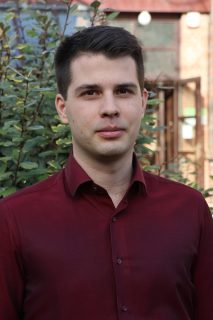Dr. Patrik Mag, a university assistant lecturer, conducts pharmacological research, serves as the President of the PhD Student Council, and works in a veterinary clinic. Besides, he has been a motorcycling enthusiast since childhood. This is hardly surprising, given that his hometown, Felsőtárkány, is not only the gateway to the Bükk Mountains but was also one of the cradles of Hungarian moped and scooter manufacturing. His father instilled a love of motorcycling in him and his brother at an early age. This passion has stayed with him, just like his deep interest in biology, which led him down the path of knowledge to the University of Veterinary Medicine Budapest. He graduated summa cum laude in 2022. His research focuses on measuring the concentration of active substances in interstitial fluid. Below is an excerpt from our conversation.
GUSZTÁV BALÁZS
My father, an auto mechanic, and my mother, a hospital administrator, wanted their children to “advance in life” and supported our education in every way. My brother followed in your father’s footsteps and now works as a vehicle engineer at Audi in Győr. I was drawn to professions closely connected to life. I wanted to choose a career where I felt useful and could contribute to my environment. I graduated from a high school class specializing in biology and chemistry, and I was admitted to the University of Veterinary Medicine on my first attempt.
Did you ever feel major obstacles in your studies?
I always tried to see a process or a “story” in every subject that I could follow, which helped me retain information more easily. Overall, I found challenges more motivating than discouraging. Beyond mastering the material, I also enjoyed passing on knowledge to others. That’s why, after my anatomy exam, I applied to become a demonstrator at the Department of Anatomy and Histology. However, I later shifted my focus from anatomy to pharmacology.
Upper-year students often said that pharmacology was one of the toughest subjects because of the vast number of active substances, almost like memorising a phone book. But I found the subject fascinating. I focused on understanding processes, whether it was mechanisms of action or the development of resistance. I soon realised that pharmacology is one of the cornerstones of veterinary practice. After earning a top grade in the exam, I wrote a scientific student research paper under the supervision of Dr. Zoltán Somogyi, an assistant lecturer, analysing the pharmacokinetics and pharmacodynamics (PK/PD) of antibiotics in swine health. Later, the head of the department, Dr. Ákos Jerzsele, invited me to participate in a program that would facilitate my admission to the PhD program. I accepted the offer but asked permission to work as a practising veterinarian alongside my PhD studies, as I felt the need for professional feedback.
How did you find a clinic to work in?
During my fifth year, while driving one day, I received a call from Dr. Zoltán Somogyi’s wife, Dr. Kata Baranyi. She told me that the Buda-based Boxi Veterinary Clinic, where she worked, was looking for a final-year student for an assistant position, with the possibility of continuing as a veterinarian after graduation. I was interested in the opportunity, so I contacted the clinic’s director, Dr. Orsolya Szepes. The week after our conversation, I started working there, and I’ve been with the clinic ever since, alongside my university responsibilities.
You’ve been a veterinarian for three years now. You’re also pursuing a PhD, performing surgical procedures, and writing scientific articles. Pet owners even express their gratitude for your work on Facebook. How satisfied are you with your achievements?
I am an extreme perfectionist in both my work and personal life. I always strive to give my best and prove myself, both to others and to myself. However, because I am involved in so many activities, I sometimes feel that I don’t have enough time to truly immerse myself in any particular area. After completing my PhD, I definitely want to change that. Trying to excel in so many fields is physically and mentally exhausting.
As the President of the PhD Student Council, what are your main responsibilities?
I represent the interests of PhD students in the Senate and the Doctoral School. I can rely on the support of my fellow delegates, and the head of the Doctoral School, Dr. Bence Rácz, is also a helpful partner. Under the leadership of my predecessor, Dr. Ádám Kerek, we achieved many improvements: PhD student salaries were adjusted, and we made progress on language exam requirements. Additionally, Ádám secured a dedicated financial budget for the PhD Student Council. I do my best to make sure that these funds are allocated to benefit PhD students. A significant portion of the budget is used to fund a grant that supports PhD students in attending international conferences.

